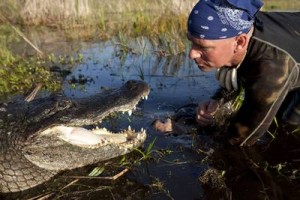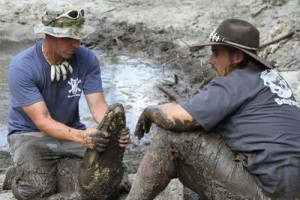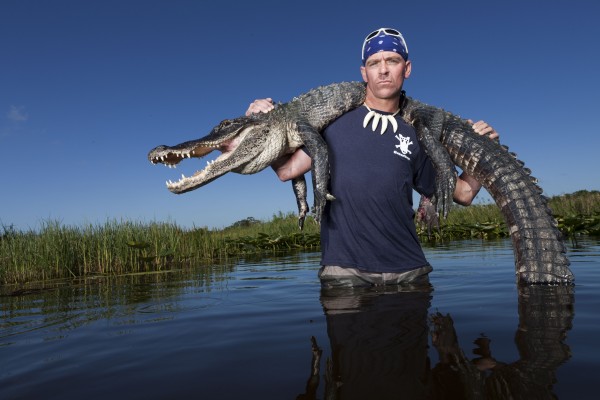‘Gator Boys’ Part I: Paul Bedard on how he took the plunge into the reptilian world

Paul Bedard and Jimmy Riffle, aka the ‘Gator Boys’ from Animal Planet, are in the business of rescuing Florida alligators from situations that many people would look at with a great sense of fear. The business partners are called into houses and commercial establishments to identify problems, develop speedy plans and catch some alligators with no injuries to either human or animal.
It’s an interesting, engaging profession that keeps the Gator Boys constantly on their toes, anticipating the next move of their reptilian friends.
Recently, Hollywood Soapbox talked with Bedard and Riffle about their unusual jobs and their hit Animal Planet series, which returns with new episodes on Sunday, June 17 at 9 p.m. Here’s Part I of our series: A lively discussion with Paul Bedard, who in addition to catching alligators is an accomplished triathlete.
Questions and answers have been slightly edited. Click here for Part II, a talk with Jimmy Riffle.
How did the TV show start?
I actually did a lot of work with TV and film. My line is always: “Making fake guys look real.” And I’ve had a lot of producers say, ‘Hey, you guys are doing the real thing. You should do your own show.’ I kind of avoided it for a while, because I kind of felt the headaches that were involved in it with some of the other guys. But business kind of dried up, so I started listening a little more when they called.
How has it been with the cameras on site?
Sometimes cameramen don’t understand the concept of silence when looking for alligators. But it’s a growing process. They’ve gotten pretty good at it. They’ve gotten pretty good of staying out of my way, out of our way, and letting us just do our thing.
How did this career with alligators begin?
I caught my first rattlesnake up in Massachusetts when I was 12 years old. … I think that kind of stuff is just in you. My dad was a cop; he wasn’t some nature guy. It’s not liked I learned it from anybody. I was always just fascinated with it as a kid. And after college, I was just following good weather around. So I would find people living in central Florida and I’d go hang out with them and couch surf and train. I was racing triathlons semi-professionally at the time. And I would just follow good weather around. And I got down to the (Florida) Keys, and we started working with sharks. My buddy, Mark Rackley and Manny Puig, they had a show on Animal Planet years ago. … So I went with the sharks with them for a while, but I definitely was sea sick. We’d be 10 miles offshore, and I’d just look at them and say, ‘I’m swimming home. I’m going back to the mainland. I’ll meet you guys at the house.’ Manny kind of got me into the gators and it seemed to be a natural fit for me.

Were you surprised by all the gator problems in Florida?
Not really. Being down there, you’re kind of used to it. A lot of people are very used to it. I’ll have one neighbor who is threatening to kill me if I remove the alligator, and the other one who is begging to have it removed because they are afraid for their child’s life. You meet all kinds of people that have all kinds of different views on the alligators, and it’s hard to reach an agreement with both of them. The best thing for me is that I don’t kill them. Most people kind of understand, OK, if I don’t get them, somebody else is going to come with the cops and they’re going to remove him and kill the alligator. If I get him, he’s not going to die.
Is there a particular case that proves the most memorable? What was one of your toughest jobs?
I always say, ‘The best trapper will probably catch between a third and half of the gators that he’s permitted for.’ And there’s plenty that have gotten away. And those are the ones that stick to my mind. I don’t like losing at things, and those are the ones that kind of bug me the most. I’ve had a few gators that stand out. Underwater, for the most part, gators are really kind of mellow and standoffish, and they’ll kind of give you the benefit of the doubt. But I’ve had a few that you get into the water with them, and you don’t have to look for them, they’re looking for you. Those cases have been memorable, for the lack of a better term, over the years.
Has the show increased interest in your business? Do you get more calls?
People don’t actually call us. They have to call the state first to issue a permit. And that goes to another trapper, and then he contacts us. What you see on the show is people calling us back that we have already contacted. We’ve been out there maybe once or twice, and then they’ll call us and say, ‘Hey, the gator’s here again.’ … If a gator swims by the house once, and they call up, that gator will never be seen again, because he was just going down the river or down the canal. He’s going to go back to where he came from. You’ll never see him again.
Could you talk about Jimmy Riffle? Is it nice to be friends and have the chance to work together?
Jimmy is great. The good thing about Jimmy is that I don’t have to worry about him. I know he can take care of himself. I know he knows what he’s doing. I know he’s going to do everything he can to help me out. We almost have a nonverbal communication a lot of times when we’re looking for a gator, when we’re working a gator. If you’re kind of stalking him in certain situations, just talking to each other can give it away. We just look at each other and know what the other one is going to do. I’ve known the kid since he was 12 years old. So I know him about as good as anyone does.
Could you give viewers a preview of the upcoming episodes?
In the first season, a lot of the catches they were on land because of the drought. If I remember correctly, a lot of the catches now are a lot more in the water. We did some better camerawork in the water. I was starting to let certain guys get in the water with the camera. … The first season, I wouldn’t let a camera guy get in the water, because I didn’t want to babysit him. So second season, we get a little better camera angles and little more camerawork with cameras on sticks stuck in the water. We found ways around putting someone in harm’s way.

In Florida, is killing alligators a real problem?
I don’t like seeing any gator get killed. And the way the trapping works in Florida, the state doesn’t really pay the alligator trapper. The state licenses a trapper, gives him a certain area and then sends him permits. And he has himself and agents under him. Now because you don’t get paid, the only way you’re going to make money is by harvesting the animal.
I can’t really think of a better way to run it. I don’t think it’s the state’s job to pay for it. So until they think of something better, I don’t think the system really can be changed right now. I just want to work within the system and save as many as I can. Because to me, I’ve got gators that are basically pets. I can kiss them on the side of the face. I can rub the side of their mouth. They’re puppy dogs. It gives you a different look at them. If you see them rolling around in the water and biting and eating dogs and hear they attack people, you normally look at them as what they really are. When you have them around a lot, you kind of see them as a lot more personality and lot more substance to them than most people really think.
Do you ever arrive on scene and it’s not really a danger?
Plenty of times. Like I said, when you have a gator that his little waterhole is dried up, and he hits a big canal and wants to go find another place, he’s going to go by somebody’s house, and they’re never going to see him again a lot of times. But they see an unsettling thing of an 8-foot alligator cruising down right behind your house, kind of freaks a lot of people out.
And the ones that are really a problem are the ones people feed. Once you feed him, he loses fear of people. Now he sees a bipedal animal walking on the dock and he hears a splash — well that’s food, because people are feeding him. So a 10-year-old boy walks on the dock and dives in for a swim, again bipedal animal, splash, food. It’s a bad combination. That’s why it’s illegal to feed alligators in the State of Florida.
The misunderstanding of gators isn’t just by the homeowner. I know people that have worked in the business for 30 years. They work for the state and see footage of me underwater with a gator, and they go, ‘Oh, that must be one of your puppy-dog alligators that you put in the water.’ Why would you say that? ‘Well, he’s not attacking you.’
It’s kind of weird when you talk to other alligator people and they don’t understand guys like myself and my buddy Manny that have been doing it a long time. It’s just second nature. Yeah, of course, gators and crocs are very mellow underwater for the most part. … They attack people a lot, but either that’s when you’re on the surface and he’s on the surface. Your head looks like a duck with a funny haircut, something small he can eat. Underwater they look at you almost with a sense of curiosity. Who are you, and what are you doing here? Every one out of a 100 will kind of unload on you, go off like a bomb for no reason. For the most part, they are very calm underwater. Even scientists and scholars involved with crocodilians, a lot of them still don’t understand that concept, and it’s kind of weird.
What’s the future for you and Riffle?
I do other work with crocodiles and other stuff in Costa Rica. I’d like to maybe expand on that. Who knows? For now, keep saving gators is really my main focus. Just keep doing what we’re doing, as long as the filming goes smoothly and people aren’t getting in our way.
By John Soltes / Publisher / John@HollywoodSoapbox.com
-
Gator Boys will return with new episodes on Sunday, June 17 at 9 p.m. Click here for more information.


salut pol bédard ici pol bédard de québec canada…..
with a temperature of minus 25 et absolutely no gators….
it’s interesting to see u in action…..bravo pollo.
I love this show. Like the fact that they want to save them. Go boys.
I live in west palm beach florida my son loves to watch your show one day we will come see your show money comes hard right now but one day we will keep up the good work gator boys
Always been a nature girl and love this show! I think for me what I like the most is the passion and love for what they do. These guys are down to earth and the real deal. And what do I like 2nd most about the show? Well, seeing Paul in his bike shorts or wet suit shorties is pretty good stuff! LOL!
i love the show
Such a huge fan of the Gator Boys. Kind of a bummer for me since I live in SoCal and all, but I’m saving up money to hopefully get out there one summer. What I wouldn’t give to be able to volunteer at Everglades Holiday Park. <3 Always praying the Gator Boys crew stays safe and is able to continue doing what they do. Such inspirations Keep it up.
Keep it up.
I love what they do! I think that Paul and Jimmy are real animal God’s. I’m a retired Veterinarian Technician, not by choice. I’d love to have the experience that they do! I think Paul is very handsome.